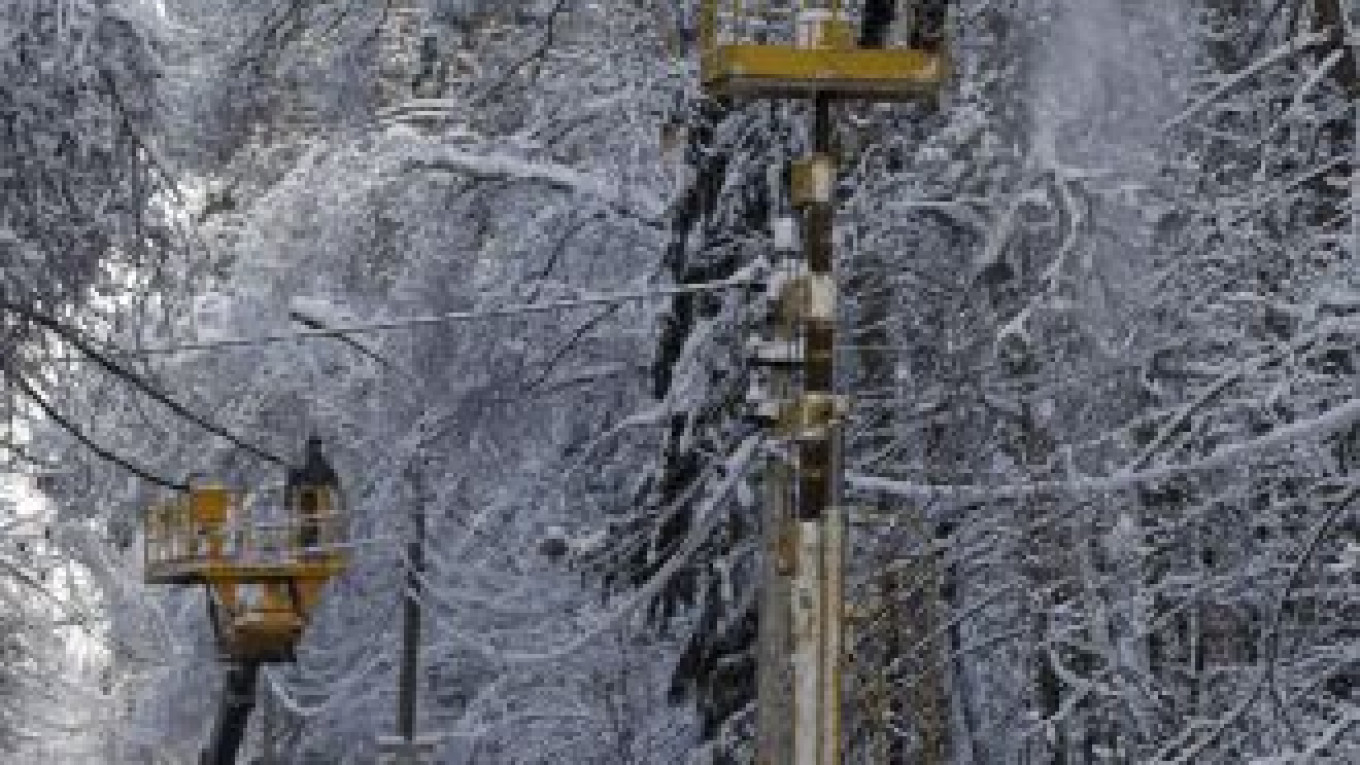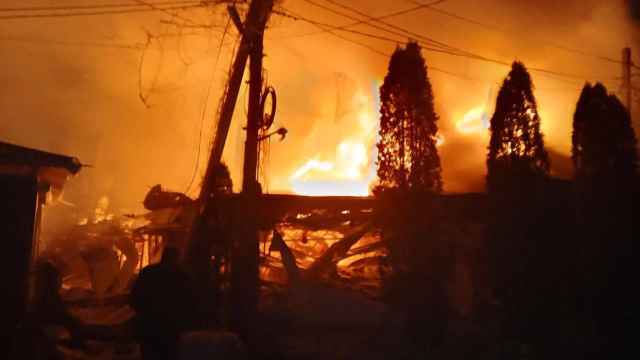Outages continued in the Moscow region on Monday as power companies struggled to restore reliable electricity supplies following a series of blackouts over the holiday period.
The Moscow Region Energy Company, or MOESK, said residents in 18 districts were left without power Monday because of planned maintenance that was scheduled to last from 8 a.m. to 6 p.m. The company said its efforts to get the region back online are being stymied by thieves. MOESK said vandals stole 200 meters of copper wire from the Leninsky district on Sunday.
“The main task remains the clearing of fallen trees and the restoration of a normal power supply to the Moscow region,” the company said in a statement released Monday. The company said it had deployed more than 1,300 engineers and cleared over 2,000 fallen trees that had interrupted power supplies.
Authorities have been struggling to restore power to thousands of homes in central Russia since the end of December, when freezing rain brought down power lines, causing power outages, including a 14-hour blackout at Domodedovo Airport.
Continuing bad weather meant that lights flickered throughout the 10-day national holiday that started Jan. 1.
On the New Year's weekend more ice storms and high winds caused blackouts in the Moscow, Tver, Nizhny Novgorod and Smolensk regions.
Moscow region Governor Boris Gromov declared a state of emergency in 18 districts on Jan. 2. By Jan. 3 the Emergency Situations Ministry was reporting that more than 430 towns and villages in the Moscow, Tver and Smolensk regions, with 40,000 inhabitants, were without electricity.
A ministry spokesman told Itar-Tass that 75 percent of those affected were in the Moscow region.
MOESK initially promised to have most power in the Moscow region up by 8 p.m. that evening, but it was not until Friday, Jan. 7 that the company announced supplies had been completely restored. The company warned, however, that some areas were being supplied by temporary power sources.
Monday's shutdowns follow planned outages in five Moscow region districts Friday and 14 on Sunday. It is unclear how many people were affected on Monday, but some 5,000 people were left without power during the Sunday outages, according to the Emergency Situations Ministry.
The energy crisis can in part be blamed on freezing rain, a rare phenomenon that occurs when falling snow melts as it passes through relatively warm layers of air but then refreezes when it lands. It forms a crust of ice up to 30 millimeters thick on branches of trees, wires, cars and road surfaces.
But on Jan. 4, Energy Minister Sergei Shmatko conceded that the problems could not be blamed only on the weather.
“Many things could have been prevented with a stock of the right equipment and proper training,” he said at a meeting in MOESK's control center. He went on to blame “poor coordination” for the shutdown at Domodedovo.
MOESK director Andrei Konovalov was forced to deny allegations that engineers had been demanding bribes for priority in being reconnected.
"Not one case of bribery has been confirmed," said Konovalov, who added that his company has sent up a hotline where consumers could report any instance of corruption.
Shmatko, for his part, did not rule out that bribes had been asked for, but said “what is important is a quick and clear response from the company.”
It is unclear what measures will be taken to prevent such a problem in the future. During a New Year's Day meeting with Putin, Shmatko said he wanted to fell about eight hectares of trees in the Moscow region to reduce the risk to power lines.
The January power cuts followed similar problems in late December. An estimated 20,000 passengers were stranded as both Sheremetyevo and Domodedovo airports were shut down from Dec. 26 to Dec. 29 because of ice on runways and planes. Domodedovo, which is the country’s business airport, only had electricity restored Dec. 27.
The crisis was poorly managed by airport operators. The failure of airlines and airport staff to provide even basic assistance or information on the situation led to scuffles between passengers and airport staff. The chaos at the airports, which culminated with reports of several hundred people trying to storm the departure area at Sheremetyevo, prompted President Dmitry Medvedev to order Prosecutor General Yury Chaika to investigate the transport collapse.
The crisis also revealed weaknesses in logistical preparations. Aeroflot chief executive Vitaly Savelyev told a Cabinet meeting Dec. 29 that his airline had only enough de-icing liquid to last until Dec. 31.
Prime Minister Vladimir Putin prohibited officials in affected regions and ministries from taking their New Year vacation, telling the same meeting that “everyone must be at his post.”
By New Year’s Eve, Aeroflot announced that it had fired deputy chief Vladimir Smirnov over the debacle. On the same day Domodedovo Airport director Vyacheslav Nekrasov was relieved of his duties and moved to another position, the airport said.
MOESK has set up a 24-hour hotline (8-800-700-40-70) for residents to call for information on the maintenance shutdowns.
A Message from The Moscow Times:
Dear readers,
We are facing unprecedented challenges. Russia's Prosecutor General's Office has designated The Moscow Times as an "undesirable" organization, criminalizing our work and putting our staff at risk of prosecution. This follows our earlier unjust labeling as a "foreign agent."
These actions are direct attempts to silence independent journalism in Russia. The authorities claim our work "discredits the decisions of the Russian leadership." We see things differently: we strive to provide accurate, unbiased reporting on Russia.
We, the journalists of The Moscow Times, refuse to be silenced. But to continue our work, we need your help.
Your support, no matter how small, makes a world of difference. If you can, please support us monthly starting from just $2. It's quick to set up, and every contribution makes a significant impact.
By supporting The Moscow Times, you're defending open, independent journalism in the face of repression. Thank you for standing with us.
Remind me later.






